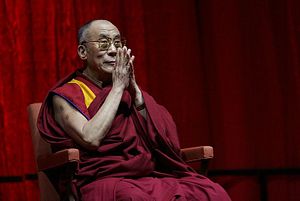This year marks the 60th anniversary of Tibetan uprising. On March 10, 1959, a revolt erupted in Tibet’s capital Lhasa, which finally resulted in the flight of the 14th and current Dalai Lama. In the northern Indian town of Dharamshala, the Dalai Lama, the most important spiritual leader for many Tibetan Buddhists, established a Tibetan government-in-exile that still exists today.
Recently, the Dalai Lama accepted an exclusive interview with Reuters, where he once again talked about the issue of his potential successor — the most sensitive topic for the Tibetan government-in-exile as well as for the Chinese government.
During the interview, the 83-year-old Dalai Lama told Reuters that it was possible that once he dies, his reincarnation could be found in India, where he has lived in exile for 60 years.
“China considers Dalai Lama’s reincarnation as something very important. They have more concern about the next Dalai Lama than me,” said the Dalai Lama.
“In future, in case you see two Dalai Lamas come, one from here, in free country, one chosen by Chinese, then nobody will trust, nobody will respect [the one chosen by China]. So that’s an additional problem for the Chinese! It’s possible, it can happen,” he added.
Interestingly, on March 19 — one day after Reuters’ exclusive interview with the Dalai Lama was published — China’s Foreign Ministry spokesperson Geng Shuang anticipated a related question at the regular press conference. He told the reporter that he had been waiting for this specific question regarding the Dalai Lama’s reincarnation and his reply was “authoritative.”
Geng said:
Reincarnation of living Buddhas, as a unique institution of inheritance in Tibetan Buddhism, comes with a set range of rituals and conventions. The Chinese government implements the policy of freedom of religious belief. The reincarnation system is respected and protected by such legal instruments as Regulations on Religious Affairs and Measures on the Management of the Reincarnation of Living Buddhas.
The institution of reincarnation of the Dalai Lama has been in existence for several hundred years. The 14th Dalai Lama himself was found and recognized following religious rituals and historical conventions and his enthronement was approved by the then central government. Therefore reincarnation of living Buddhas including the Dalai Lama must comply with Chinese laws and regulations and follow religious rituals and historical conventions.
In 2007, the State Administration for Religious Affairs issued Measures on the Management of the Reincarnation of Living Buddhas. (Now the State Administration for Religious Affairs has been placed directly under the Chinese Communist Party’s United Front Work Department.)
Article 2 of the Measures stresses that “the reincarnation of a living Buddha shall follow the principles of safeguarding national unity, safeguarding national unity, safeguarding religious harmony and social harmony, and maintaining the normal order of Tibetan Buddhism” and that “the reincarnation of living Buddhas is not subject to interference and control by any organization or individual outside the country.”
This article apparently targets against the Dalai Lama’s future reincarnation. It has long been assumed that China’s government will seek to handpick the next Dalai Lama, to ensure Tibet’s top Buddhist leader is friendly to Beijing in the future.

































